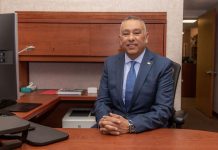Jorge Valerdi has spent the last 13 years fighting the San Diego court system.
Judges know him by name. He’s a familiar face to attorneys.
But Valerdi is far from a criminal.
Instead, the 71-year-old spends his time in court as a court appointed special advocate for Voices for Children, a nonprofit organization that works with the courts, lawyers, judges and other agencies in finding permanent and stable homes for children who were abused or neglected.
When there is a case in the courts involving minors, a court appointed advocate researches the case by interviewing the victim, family members, friends, doctors and psychologists. The advocate then turns in a written report to a judge, detailing their recommendations as to where a child should be living, whether it’s with a relative or in foster care. The cases are confidential.
Valerdi retired from an engineering and telecommunications career in Chula Vista at 55, since then he has decided to spend retirement life volunteering.
“I decided to change my career in the sense of helping children, helping minors,” he said.
Initially,Valerdi had no idea how to help. So he researched many organizations from the Boys and Girls Club to the YMCA.
He determined that none of them were a fit. Ultimately his research lead him to Voices for Children.
Valerdi dedicates about 10 hours a week to a case. He said sometimes the cases are so dramatic that it brings him to tears.
He often wonders why a child deserved to be treated the way they did, or why a parent or relative would ever hurt a child.
“The minors are usually the ones who suffer the abuses without any protection and it usually comes from someone they trusted so, yeah, of course I get emotional,” he said.
Despite the circumstances, he has to keep his emotions in check because he said he can’t make recommendations acting on his emotions or on bias.
Valerdi said the best recommendation has to be made, even if it’s not a popular choice as to where a child should live.
Valerdi, the father of two adult children, said seeing a child with bruises, marks or any other physical injury puts things in perspective.
“My son and daughter are truly blessed,” he said.
Nor has Valerdi experienced any abuse as a child. He said to become a court appointed special advocate, one of the requirements is that a person cannot experience what a victim has experienced because it could add a biased or revengeful recommendation.
Valerdi said about 35 to 40 percent of cases in juvenile court are Hispanic which requires a Spanish speaker. While he adds value to the organization because he is Hispanic and speaks Spanish fluently, Valerdi said there is a shortage of Hispanic advocates.
He said he’s always wanted to help children because they are the ones who need the assistance of adults.














